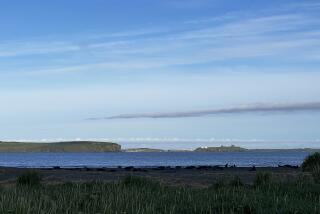Camping Ban on Santa Cruz Island Is Lifted
- Share via
The National Park Service has lifted a temporary ban on camping on Santa Cruz Island, imposed in November to ensure public safety while hunters taking aim at the island’s feral pigs focused their efforts near camping areas.
The park service said the $5-million pig hunt was necessary to protect the endangered Santa Cruz Island fox. Since last April, a New Zealand-based hunting company that it hired has killed about 4,800 pigs and cleared an estimated 85% of the island, said Yvonne Menard, a park service spokeswoman.
Day trips have continued throughout the hunt, and the loss of campers was made up for by more than double the number of daily visitors to the Prisoner’s Harbor section of the island, Menard said.
“It looks like, overall, it didn’t hurt our visitation very much,” she said.
Last week, the park service announced that the first bald eagle eggs had been laid on the island in more than half a century.
The government will not reveal the location of the nesting bald eagles and their two eggs, but Menard said they are out of harm’s way -- safe from both hunters and returning campers. “The hunting is not actively occurring near the nest site,” she said.
In May 2005, animal rights activists sued the park service and the Nature Conservancy, which jointly own the island 18 miles off the Ventura County coast, to stop extermination of the wild pigs.
The government said the feral pigs, which are not native to the island, have damaged archeological sites and threatened nine native plant species as well as, indirectly, the Santa Cruz Island fox.
The fox -- about the size of a house cat -- has been preyed upon by golden eagles, which officials say came to the island about 15 years ago to feed on the pigs.
The park service has worked since 1999 to rebuild the fox population through captive breeding. It has also relocated more than 40 golden eagles, which are the foxes’ prime predators, and replaced them with bald eagles.
Mill Valley veterinarian Elliot Katz, founder and president of In Defense of Animals, one of the plaintiffs in the case against the park service and the Nature Conservancy, said Monday that despite losing two earlier legal challenges to stop the slaughter, he would continue to fight.
Katz said he believes that the government did an inadequate job of assessing the environmental damage of killing thousands of wild pigs, descendants of the first pigs brought from the mainland in the 1850s.
“Whether there are pigs [left] there or not, we have to see this thing through,” Katz said. “It’s setting a bad precedent to let them get away with not abiding by the law and their own standards” for environmental review.
Thom Mrozek, a spokesman for the U.S. attorney’s office in Los Angeles, said the government has asked Federal Central District Judge Dickran Tevrizian Jr. for a summary judgment to dismiss the case.
A hearing on this motion, and the plaintiff’s request to go to trial, is set for next Monday.
More to Read
Sign up for Essential California
The most important California stories and recommendations in your inbox every morning.
You may occasionally receive promotional content from the Los Angeles Times.










